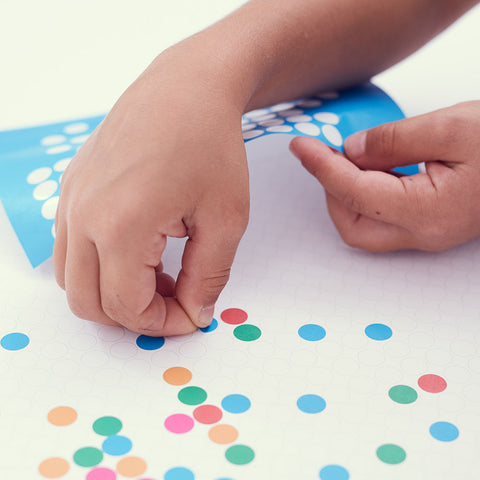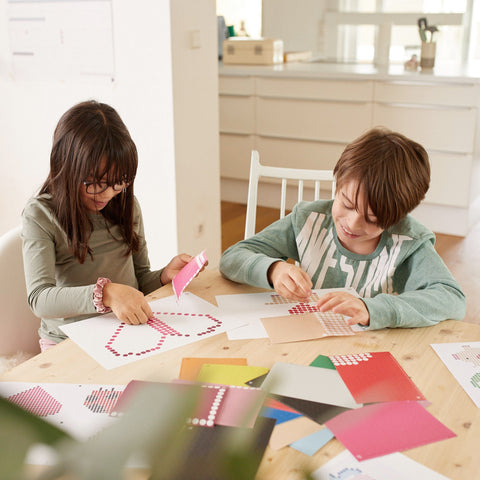Our glue-worthies are not only creative and beautiful craft fun ... The innovative creative technique also has some great effects - especially with children! We spoke to a professional who knows: Ina Greulich from occupational and learning therapythat our dots also use in their practice.
We start our interview series with her: 5 questions for ...
Short info: Who are you? What do you do?
My name is Ina Greulich, I'm in my 50s, live in Dresden and work in East Saxony. I have two grown children.
I am an occupational therapist in my own practice. We work with people of all ages. Outpatient occupational therapy is a remedy prescribed by a doctor - it is intended to help people with illnesses or disabilities to cope well with their everyday lives. A large part of our work is the accompaniment of children and their families.
1.) How can you simply support your children in terms of fine motor skills as parents?
It's very simple: let children do it themselves!
Offers opportunities that you, dear parents, do yourself. Then your children may also be enthusiastic. But above all: do not take everyday activities out of the children's hands just because it is taking too long for you! Buttons, zippers, shoelaces, smear cuts, turn the pages of a book, shuffle cards ..., all everyday activities are good opportunities to develop fine motor skills and that is particularly inexpensive.
2.) When should you see a therapist?
First of all: Children are not sick if they do not meet a certain standard of performance and not every unsuccessful attempt to learn something fine motor skills is in need of therapy.
Please watch your children closely:
- Do the attempts to use the hands look skillful or very clumsy?
- Does the child get involved in offers, try it out, advance a project or avoid fine motor activities quietly or angrily "I have to ...", "You do it ..." or "I just can't do it ..." or worse ?
- Is the child concentrating on where it is doing something or are the eyes and thoughts elsewhere?
- Does the child learn the activities and develop or does it not succeed even after many attempts?
Observes attention, concentration, patience, perseverance - getting a thing to an end. These skills are important not only for fine motor skills, but also for learning in general.
Going to the occupational therapist is advisable if:
- the child is “jack of all trades” and cannot be persuaded to work on a project with an adult for around 10 minutes - with 3-4 years of age, up to 30 minutes in preschool age - and to concentrate on it without Wanting or doing something different in between and the adult does not manage to get his child to do it over time.
- the child's activities look very clumsy and actions do not succeed even after many repetitions.
- the child is not satisfied himself, he wants to learn something and cannot.
Since occupational therapy is one of the medically prescribed remedies, if you suspect developmental difficulties you should discuss your concerns with your pediatrician.
3.) Helicopter or raven parents: How do you find the right balance? What should you trust your child?
Good bonds and relationships are the be-all and end-all and you don't buy them, you live them.
First principle: The child can do everything alone! Parents allow and encourage. Parents involve their children in the necessary everyday tasks - so skillfully that it is not a “must” but a “allowed”.
Second principle: parents take care of the accident protection, i. H. z. B. They stand on the climbing frame to catch their child if necessary, parents show the correct use of tools and watch the first attempts…. Not only do the children learn, but also the parents: namely, what the child can do!
Third principle: Parents are role models!
Fourth principle: Dear parents, do not look so much into parenting guides, do not drive yourselves crazy. Most parents have a good gut feeling, they used to be children themselves.
Fifth principle: Parents are head of families, not friends of the children.
Children need rules because somehow they first have to learn what is right. Rules are based on the values that a family wants to convey, i.e. what parents want, how their child will behave as an adult. Rules are discussed. Children can have a say to a certain extent - they like to come up with ideas on how to solve problems. Still, the parents have the last word. Parents lead their children benevolently and consistently, i. H. a lot of praise, consequences in an emergency, clever, diplomatic, trusting, reflecting feelings.
4.) You also know our products: What promotes bonding in children?
- Attention, concentration, perseverance
- care
- Hand-eye coordination
- Fine motor skills of the fingers
- Imagination, color perception
- Working according to instructions - work structure
- Positive emotions - sense of achievement, self-worth
- Dealing with failures, if something goes wrong - corrections can be made through your paper and not all of the work is wasted
- Relationship between child and caregiver
- …..

5.) Do you have some wake-up and calm-down tips for children?
Also very simple: parents, make the electronic media off. Deal with your children, be role models. After doing the housework together, there is a game together (instead of a TV program). But you don't have to be entertainers all the time - children have to keep themselves busy. You are also welcome to be bored - that inspires ideas. Children don't have to sit in an offer of 100 things either - reduce the children's room to a few toys.
For me there was always a tip: Put away some things that are something special when they are brought up.
Thank you very much for the nice conversation and your inspiring, detailed answers!
:-)





